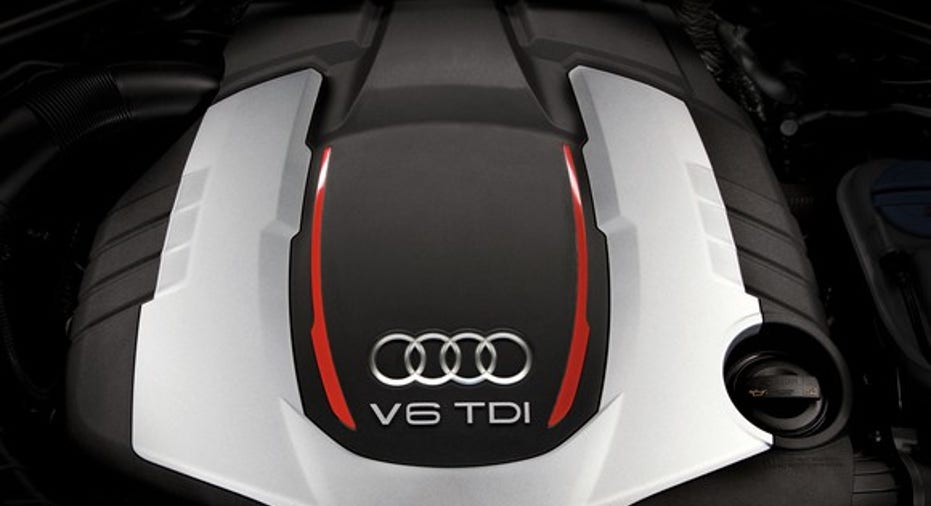Volkswagen Nears Another Settlement in its Emissions Cheating Scandal

About 85,000 Porsche, Audi, and VW vehicles in the U.S. have a 3.0 liter "TDI" diesel engine programmed to cheat on emissions tests. VW is nearing a settlement with U.S. regulators to fix or buy back those vehicles, an executive said on Wednesday. Image source: Volkswagen.
Volkswagen (NASDAQOTH: VLKAY) is nearing a final settlement with U.S. officials over vehicles powered by a 3.0 liter diesel engine that was programmed to cheat on emissions tests, an executive said on Wednesday.
Dietmar Voggenreiter, the global sales chief for VW's premium Audi brand, told Reuters that VW is having "really good discussions" with U.S. regulators and hopes to have a final agreement in place by early November, possibly sooner.
A settlement covering 85,000 diesel-powered vehicles in the U.S.
VW has admitted to programming the engine-management software in millions of diesel-powered vehicles to cheat on government exhaust emissions tests. The software was used with several different engine types, two of which were sold in the United States: A 2.0 liter four-cylinder turbo-diesel, and a larger 3.0 liter six-cylinder variant.
VW and U.S. authorities agreed on a settlement in June that covered the roughly 475,000 VW and Audi vehicles in the U.S. with the smaller 2.0 liter engine. Under that agreement, VW committed to pay as much as $15.3 billion to buy back or repair those cars, and to cover fines and related costs.
But that agreement didn't apply to the roughly 85,000 additional VW, Audi, and Porsche vehicles equipped with the larger diesel engine, which used a different version of the software. VW is currently holding discussions with the U.S. Environmental Protection Agency (EPA) and the California Air Resources Board (CARB) in an effort to get to an agreement to repair or buy back the vehicles with the 3.0 liter turbo-diesel engine.
It's those discussions that Voggenreiter expects to conclude successfully in October or early November.
What a settlement will mean for VW
CEO Matthias Mueller, who took over soon after the allegations became public, has been eager to get past the worst of the scandal. The June settlement covered civil claims against VW related to the 2.0 engines. But VW still faces potential criminal liability in the U.S. as well as costs related to the 3.0 engines -- and action pending by other governments around the world.
It's not yet clear whether the EPA and CARB will force VW to offer to buy back the 85,000 vehicles with the 3.0 engines, most of which are upscale SUVs. That wouldn't be cheap: Assuming a blue book value of $30,000 each, the tab for a buyback would come to a little over $2.5 billion. It's possible that the company will be allowed to recall and repair them instead. That would cost much less, and would represent a bit of good news for VW and its shareholders.
Meanwhile, VW's busy lawyers are also negotiating a settlement with Federal prosecutors who say they have found evidence of criminal wrongdoing related to the scandal. It's likely that VW will be able to settle any charges in exchange for a hefty fine and an agreement to accept government monitoring for a period of time. But that hefty fine could run to $2 billion or more.
The upshot: Another step forward on a long path to recovery
U.S. owners of the affected 3.0 liter vehicles will be happy to hear of a settlement. It will at least help move VW forward from the scandal -- as will a settlement with the Department of Justice.
Toyota (NYSE: TM) and General Motors (NYSE: GM) have found themselves embroiled in expensive scandals in the last several years. Both were able to settle with U.S. government authorities, and both have largely recovered.
The clear criminal intent in VW's scheme to cheat on emissions testing while marketing its "clean diesels" probably hurt it more than its rivals were hurt by their own mistakes, but if its products are strong it will be able to recover in time -- at least in the U.S. VW will have to fight another set of battles to recover in Europe and elsewhere. It still has to travel a long road to fully get past the consequences of its decision to cheat on emissions tests.
A secret billion-dollar stock opportunity The world's biggest tech company forgot to show you something, but a few Wall Street analysts and the Fool didn't miss a beat: There's a small company that's powering their brand-new gadgets and the coming revolution in technology. And we think its stock price has nearly unlimited room to run for early in-the-know investors! To be one of them, just click here.
John Rosevear owns shares of General Motors. The Motley Fool recommends General Motors. Try any of our Foolish newsletter services free for 30 days. We Fools may not all hold the same opinions, but we all believe that considering a diverse range of insights makes us better investors. The Motley Fool has a disclosure policy.



















